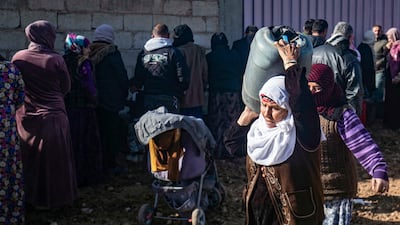Women and girls in Syria are far more disproportionately exposed to gender-based violence, exploitation and lack of healthcare access 13 years into the war, the UN Population Fund's regional director for Arab States told The National.
"Since the onset of the war, women and girls have been facing progressively worsening conditions," said Laila Baker.
Women and girls account for nine million out of the 16.7 million people in desperate need of humanitarian assistance across the country, including an estimated 133,000 who are pregnant or breastfeeding.
Across Syria, more people need aid than ever before, with the figures having increased from 660,000 in 2012, a year after the country's civil war broke out.

Women and girls are facing a crisis at a primary care level, including "where there's a complicated delivery and postnatal care", she said, calling it "very problematic".
These issues are more predominant in poorer communities in Syria, where limited access to food is largely affecting breastfeeding mothers.
This has meant more poor maternal outcomes to thousands of women, and significant effects on women's mental health in the country, she says.
Ms Baker said the political intricacies of the conflict, which are still unresolved 13 years on, "should not detract from the fact that there is a need to bring back to the centre the critical need to protect women and girls".
The war has left 90 per cent of the population destitute, according to UN figures published last year.
Available funding has been largely focused on security and weaponry and not social security or health care.
This means less money is being spent on addressing issues facing women, which are often seen as a "peripheral group".
The fighting has been a drain on an already stressed healthcare and social welfare system and caused "the disintegration of a social fabric that might have protected them [women] in some other form".
Ms Baker, who was the UNPFA's representative in Syria in 2012, highlighted widespread social stigma in different parts of the country against widowed, divorced and abandoned women – a situation that has left them "much more vulnerable to poverty and, therefore, exploitation".
UN Population Fund regional director for Arab States
The country is also experiencing its worst surge in violent attacks since at least 2020.
More than 16,000 women were killed at the hands of different parties between March 2011 and March 2023, according to the UN.
"Right now, the conflict is so entrenched there that we don't even know if – we could reconcile today – what the social fabric of Syria would look like."

Thousands of hospitals, including centres supported by the UNPFA and "safe spaces", have collapsed or been damaged in the fighting.
This has left pregnant women and new mothers struggling to secure access to essential care.
Ms Baker said the worry was now on how to sustain assistance for women in need at a time when funds are drying up.
Of the 45 safe spaces that the UNPFA created for women across the country, 31 are at risk of permanent closure.
The safe spaces are meant to protect women and girls from domestic and gender-based violence, conflict-related sexual abuse and other forms of exploitation, as well as help them to overcome reproductive health challenges, Ms Baker said.
"We're trying to lay the foundations through those centres. To be able to say women are a facilitating factor for conflict resolution. They just do business differently. There's less tension, it's not militarised," she said.
A lack of humanitarian personnel due to low pay, difficulties in securing essential supplies because of sanctions, as well as the inability to provide help where the government is not prioritising women's and girls health have also created challenges for the UNPFA's work in Syria.
"That does require funding but it also requires allowing for some space for those voices of women to be heard at the tables where decision making is happening" she said.

